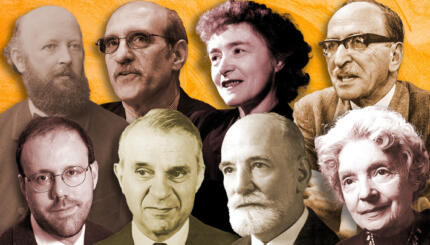A Jewish joke is more than just a funny story, for it often has a message for the listener. “First you laugh at a Jewish joke or quip. Then, against your will, you suddenly fall silent and thoughtful. And that is because Jews are so frequently jesting philosophers. A hard life has made them realists, realists without illusions,” writes Nathan Ausubel, in the introduction to his Treasury of Jewish Humor.
Many Jewish jokes and anecdotes have made a definite impact on the mind and character of the Jewish people, because they are inspired by a profound wisdom. Though not always anticipated at first, it becomes manifest as soon as we reflect upon them.
A classic Yiddish story makes the following observation:
When you tell an am ho-oretz(peasant) a joke, he laughs three times: once, when you tell it, once, when you explain it and once when he understands it.
When you tell a landowner a joke, he laughs twice: once when you tell it and once when you explain it — he will never understand it.
When you tell a military officer a joke, he laughs only once, when you tell it, because he won’t let you explain it, and of course, he doesn’t understand it.
But when you tell a Jew a joke, he tells you that he has heard it before, and that you are telling it all wrong, anyway.
Turning Lament Into Laughter
Humor is one of the most effective ways of confronting adversity and coping with difficult situations, especially when we have little control over them, or none at all. “By laughing at our fate, it is as if we were stepping out of a situation and looking at it from a distance, as if we were outside observers, so to speak,” writes Rabbi Reuven Bulka.
With your help, My Jewish Learning can provide endless opportunities for learning, connection and discovery.
By so doing, we gain the ability to transcend the circumstances, which may be the cause of our anguish. Theodor Reik, a disciple of Sigmund Freud who settled in New York in the 1920s, remarked that life is often tragic and sad. By joking about it, we succeed in transcending the tragic character of an event and bringing it under our control. “By using humor, the lament often turns into laughter,” remarked Reik (Jewish Wit, New York, 1962).
What do you suppose makes Jews joke so much about adversity? “It is the instinct for self-preservation” says Ausubel. “By laughing at the absurdities and cruelties of life, we draw much of the sting from them. The jester’s bells make an honest tinkle, and his comic capers conceal his inner gravity. His satire and irony have one virtue: you never for a moment suspect that his barbs are directed at you. And so you laugh boisterously, feeling superior to the poor shmiggege, while all the time, it is you who are the target!”
In Jewish humor, comedy and tragedy are intertwined and it is often what you might call “laughter through tears,” or as we say in Yiddish, “a bitterer gelekhter!”
Jewish humor is unique, not only because it pokes fun at our shortcomings and weaknesses, but because it reflects upon the history of our people. Let us consider, for example, some of the anecdotes and jokes that express our determination to stay alive in spite of everything and our resolution to overcome the threatening situations in which we find ourselves.
A classic story, illustrating the instinct of survival, is an anecdote quoted by Reuven Bulka:
A Jew in Russia falls into a lake, and, not knowing how to swim, he frantically screams, “Help, save me!” But his calls are totally ignored by all present, including a number of soldiers standing nearby. In desperation, the Jew yells out, “Down with the czar!” At that moment, the soldiers immediately jump in, yank the Jew out of the water, and haul him off to prison.
Staying Alive
To stay alive, in spite of all forms of oppression, has been one of the major concerns of the Jewish people through the centuries, and their jesters found many ways to convey this message in humorous terms.
In France, during World War II, a funny anecdote circulated among Jews:
A Jew manages to hide in a psychiatric asylum during the war. He is acting like the other demented patients. One day, the director of the institution informs the residents that the Führer, Adolf Hitler, is planning to visit the asylum. When he enters the main hall, they are told, they are to stand up and greet him with the words “Heil Hitler!”
The day comes, and they all welcome the Führer with the words they had so carefully rehearsed, except for the Jewish man, who remains seated in the back of the hall.
“You,” says Hitler, “why didn’t you greet me like everybody else?”
“My Führer,” says the Jew, “they are all meshuge [insane]. I am not!”
Hope, Always
Even in the face of impending doom there may still be some hope, as the following story will tell us:
Prominent scientists have just announced that, as a result of the global warming phenomenon, an uncontrollable flood would soon devastate Planet Earth and bring death to every living being. There were only three days left before doomsday.
The Chief Rabbi of Israel goes on international radio and says: “Fellow Jews, we must all accept the will of God with humility. We must prepare ourselves to meet our Maker and pray that God may receive us with love and compassion.”
The leaders of the Hasidim address their communities and say, “Yidn (fellow Jews), let us do teshuvah and repent from our sins, and let us be prepared for the great Day of Judgment, at which time we will appear in the presence of the Court on High.”
The science and biology students of the universities of Jerusalem, Tel Aviv, Haifa, the Negev, together with the leading scientists of the Haifa Technion and the Weizmann Institute, immediately go on the air and say, “Fellow Jews, everywhere, we have heard the terrible news, and we must not waste any time, for we just have three days to learn how to live under water.”
The lesson of the story is quite significant: Jews wish the world to know that they are determined to survive even the worst hell, says Bulka. They will mobilize all their energies and abilities to stay alive, even in the midst of severe persecutions. The victims of discrimination and injustice have no other way than to rely upon their wit and intelligence in order to overcome the hatred of their enemies.
Responding With Dignity and Wit
Because they faced discrimination and anti-Semitism so many times in the past, Jews had to find ways of responding with dignity — but often also, with a certain amount of biting wit — to these unwarranted attacks on their personalities. One of these stories brings a Jew and an anti-Semite face to face:
An altercation takes place at a royal reception at Buckingham Palace, between the Jewish philanthropist, Sir Moses Montefiore, and an unfriendly Russian Grand Duke.
Shocked that a Jew should have been invited to an aristocratic gathering, the Grand Duke slyly remarks to Sir Moses Montefiore that he had just returned from Japan, and he had been intrigued to learn that in Japan, there were neither Jews nor pigs. Sir Moses calmly responds to the Grand Duke, “This is indeed quite interesting. Now, suppose you and I were to go to Japan, it would then have one of each!”
In the battle of wits, unlike other battles, a Jew could win an argument by exposing the absurdity of the prejudice. This approach often became the only way that enabled the Jew to retain his sanity and survive the inhuman conditions that were imposed upon him:
An anti-Semite declares without shame, “All our troubles come from the Jews!” The Jew responds: “Absolutely! From the Jews — and the bicycle riders!”
“Bicycle riders? Why the bicycle riders?” asks the anti-Semite. “Why the Jews?” asks the Jew.
This series originally appeared as a single article in Midstream magazine, which was anthologized in Best Jewish Writing 2003. It is reprinted with permission.



